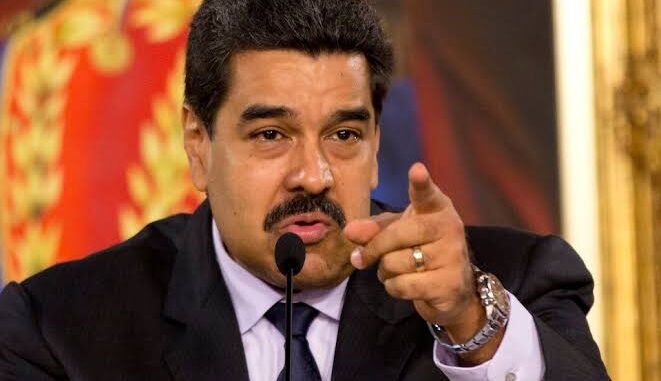
Guyana Faces Accusations from Nicolas Maduro over ExxonMobil’s Oil Production in Disputed Waters..
In a recent escalation of tensions, Nicolas Maduro, the President of Venezuela, has accused Guyana of allowing the U.S.
energy giant ExxonMobil to exploit oil resources in maritime territories that Venezuela claims as part of its sovereign rights. This dispute, rooted in a long-standing territorial conflict between the
two countries, has reached new heights due to the strategic value of the offshore oil reserves. Maduro’s remarks have sparked fresh debates about the geopolitical dynamics in the region, the role of foreign corporations, and the future of Guyana’s oil industry.
Historical Context of the Dispute
The dispute between Venezuela and Guyana dates back to the 19th century, and it centers on the ownership of the vast Essequibo region, a resource-rich area that encompasses valuable land and offshore waters. Venezuela claims that the region belongs to it, citing historical maps and agreements, while Guyana asserts that the territory has been
recognized as part of its sovereign state under international law, particularly after the 1899 arbitration ruling which awarded the territory to Britain (then Guyana’s colonial power). The controversy reignited in the 1960s when Guyana gained independence, and Venezuela began to reassert its claim.
In recent years, the stakes have increased with the discovery of significant offshore oil reserves in the disputed waters. ExxonMobil, one of the world’s largest oil companies, struck a major deal with the government of Guyana to explore and extract oil in the
region, beginning its operations in the Stabroek Block off the coast of Guyana. These discoveries are considered among the most important in the Western Hemisphere in the past few decades, making Guyana one of the fastest-growing oil producers globally.
Maduro’s Accusations
Nicolas Maduro’s accusations against Guyana and ExxonMobil come as no surprise, given Venezuela’s long-standing objections to foreign involvement in the disputed waters. Maduro has accused Guyana of acting in bad faith by
permitting ExxonMobil to exploit the natural resources in the region, calling the company’s operations illegal and a violation of Venezuela’s territorial integrity. Maduro has also warned that any further oil exploration by ExxonMobil in the disputed waters would not be tolerated by Venezuela.
The Venezuelan government has consistently maintained that it has exclusive rights to the Essequibo region and has sought to halt any oil drilling
activities in the area. For Venezuela, this is not just a matter of sovereignty; it is also about protecting its economic future. With Venezuela’s oil industry in crisis due to years of mismanagement, international sanctions, and a declining production capacity, the vast oil reserves of Essequibo represent a potential
lifeline for the country. Venezuela has attempted to block international companies, including ExxonMobil, from working in the region, leveraging diplomatic pressure and occasionally even military rhetoric.
Guyana’s Position and Response
On the other side, Guyana has firmly rejected Venezuela’s claims and defended its right to develop the resources in its territorial waters. The government of Guyana, led by President Irfan Ali, argues that ExxonMobil’s operations are legitimate and based on valid contracts signed with the country. Guyana has emphasized that it respects
international law and the decisions of international courts, pointing to the 2007 ruling by the International Court of Justice (ICJ), which is currently engaged in hearing a case brought by Guyana regarding the border dispute.
Guyana’s position is bolstered by the fact that many of the companies operating in the region, including ExxonMobil, have received recognition from other global powers, including the United States, the United Kingdom, and major international oil and gas companies.
Furthermore, Guyana’s burgeoning oil industry has become a critical engine for the country’s economic development. The revenues from oil production are expected to significantly boost the country’s GDP and infrastructure, which is crucial for its future.
Geopolitical Implications
The ongoing dispute has broader geopolitical implications. Guyana’s oil boom has attracted significant attention from global powers, particularly the United States, which has deepened its
economic and political ties with Georgetown. The U.S. views Guyana as a strategic partner in the region, particularly given its proximity to Venezuela, a country with which the U.S. has had tense relations for decades.
Maduro’s accusations and the continued tensions could lead to further instability in the region, especially if Venezuela chooses to escalate the situation
militarily. In recent years, Venezuela has made several provocative gestures, including increasing military presence in the disputed area, while Guyana has sought international support and legal avenues to resolve the conflict peacefully.
The role of ExxonMobil and other international corporations in the dispute is another layer of complexity. While ExxonMobil is caught in the middle of this geopolitical struggle, it continues to operate under the protection of Guyana’s government. The company has
downplayed the political risks and emphasized the economic potential of the oil reserves, which could have long-term global impacts on oil markets.
Conclusion
The oil dispute between Venezuela and Guyana, fueled by Maduro’s accusations against Guyana and ExxonMobil, underscores the intersection of territorial sovereignty, international diplomacy, and resource extraction in a geopolitically sensitive region. As oil exploration continues to play a central
role in the economies of both countries, the resolution of the Essequibo dispute remains critical to the stability of South America. For now, the issue remains unresolved, with both nations holding firm in their positions, while international actors, including ExxonMobil, watch closely from the sidelines.
Leave a Reply